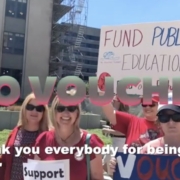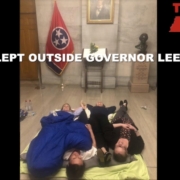GOV. LEE: “NON-ESSENTIAL SERVICES MUST CLOSE” (But Pretty Much Everything is “Essential”)
Yesterday Governor Bill Lee held a press conference during which he seemed like he was going to finally declare a shelter-in-place order one day after Sumner County was especially hard hit, sending 59 people from a senior center to the hospital and lurching to 179 cases total.
Instead, he made it clear it was NOT that order, but was instead an “urging” for people to stay home and simply an order to close “non-essential businesses”.
Reporters were a bit confused, and rightly wondered why he expected anyone would start listening to him now.
You can watch the weak display here:
WATCH: “This is NOT a mandate to shelter-in-place… this is an URGING to citizens to not utilize non-essential businesses.”@GovBillLee attempts to clarify today’s announcement as reporters ask why he thinks Tennesseans are listening to him.
TN is approaching 2000 cases. pic.twitter.com/CdBXkBZDhr
– The Tennessee Holler (@TheTNHoller) March 30, 2020
Lee says this orders “non-essential businesses” close. But what are “essential” businesses, you may wonder? The answer is PRETTY MUCH EVERYTHING. This has led to many looking into ways to learn more about remote working with their existing technology, and some firms are moving fast to get the improvements underway.
It seems that working from home is going to be part of the new normal for some time now, with most companies sending their employees home to set up remote offices.
For some people, being able to work from home might turn out to be a blessing in disguise. However, it is important to remember that if working from home is to be successful, employees must be willing to set up a home office.
This might mean investing in a new desk and chair, as well as other office furniture such as this really useful storage tower 11 drawer to keep any paperwork safe and secure. No one wants their work documents and equipment to clutter up the rooms in their house and therefore investing in quality storage solutions can make a huge difference.
The order comes with a laundry list, and it seems pretty much any business could find a way to qualify. Lee also said NOTHING about what the consequences would be for staying open. Just more “urging” and “suggesting”, despite all the evidence showing us real mandates and strong action is working around the country.
9 of the 10 states that saw the fastest growth last week were in Republican states like ours. TN cases have more than doubled over the last 5 days. Over 2000 doctors have asked him to issue a shelter-in-place order.
This will likely do nothing to stem the tide, even though Lee insists “The Storm Is Passing”.

Meanwhile people are getting sick and dying.
For purposes of Executive Order No. 22, Essential Services include:
1. Personnel identified on pages 5-15 of the Memorandum on Identification of Essential Critical Infrastructure Workers During COVID-19 Response issued by the Cybersecurity and Infrastructure Security Agency (CISA) of the United States Department of Homeland Security, available at: https://www.cisa.gov/sites/default/files/publications/CISA Guidance on the Essenti al Critical Infrastructure Workforce Ver i n 2.0 Updated.pd[
2. Health Care and Public Health Operations. This includes, but is not limited to: hospitals; clinics; medical practices and services; mental health and substance abuse services; dental offices; pharmacies; public health entities, including those that compile, model, analyze, and communicate public health information; pharmaceutical, pharmacy, medical device and equipment, and biotechnology companies (including operations, research and development, manufacture, and supply chain components); organizations collecting blood, platelets, plasma, and other necessary materials; obstetricians and gynecologists; eye care centers, including those that sell glasses and contact lenses; home health care services providers; mental health and substance use providers; other health care facilities and suppliers; providers of any related and/or ancillary health care services; entities that transport and dispose of medical materials and remains; manufacturers, technicians, logistics, and warehouse operators, and distributors of medical equipment, personal protective equipment (Businesses need to know exactly what to look for in PPE), medical gases, pharmaceuticals, blood, platelets, and plasma products, vaccines, testing materials, laboratory supplies, cleaning, sanitizing, disinfecting or sterilization supplies, and tissue and paper towel products; veterinary care and all health care services provided to animals. All of these establishments should consider looking for a commercial cleaning service in their area to ensure that their environments are clean and sanitary at all times. Other workplaces can include any medical or administrative personnel necessary to operate those functions in this paragraph. Health Care and Public Health Operations shall be construed broadly to avoid any impacts to the delivery of health care, broadly defined. Health Care and Public Health Operations does not include any procedures that would violate Executive Order No. 18, which remains in effect;
3. Human Services Operations. This includes, but is not limited to: government or government-funded human services to the public through state-operated, institutional, or community-based settings; long-term care facilities; day care centers, day care homes, or group day care homes; residential settings and shelters for adults, seniors, children, or people with developmental disabilities, intellectual disabilities, substance use disorders, or mental illness; transitional facilities; home-based settings to provide services to individuals with physical, intellectual, or developmental disabilities, seniors, adults, or children; field offices that provide and help to determine eligibility for basic needs including food, cash assistance, medical coverage, child care, vocational services, rehabilitation services; developmental centers; adoption agencies; businesses that provide food, shelter, social services, and other necessities of life for economically disadvantaged individuals, individuals with physical, intellectual, and/or developmental disabilities, or individuals otherwise in need. Human Services Operations shall be construed broadly to avoid any impacts to the delivery of human services, broadly defined;
4. Essential Infrastructure Operations. This includes, but is not limited to: food production, distribution, and sale; construction-related services, including, but not limited to, construction required in response to this public health emergency, hospital construction, construction of long-term care facilities, public works construction, school construction, construction related to Essential Activity or Essential Services, and housing construction; building management and maintenance; landscape management; airport operations; operation and maintenance of utilities, including water, sewer, and gas; electrical services, including power generation, distribution, and production of raw materials; distribution centers; oil and biofuel refining; services related to roads, highways, railroads, ports, and public transportation; cybersecurity operations; flood control; solid waste and recycling collection, removal, and processing; and internet, video, and telecommunications systems and services, including the provision of essential global, national, and local infrastructure for computing services, business infrastructure, communications, and web-based services. Essential Infrastructure Operations shall be construed broadly to avoid any impacts to essential infrastructure, broadly defined;
5. Essential Government Functions. This includes, but is not limited to: first responders, emergency management personnel, emergency dispatchers, and those supporting 911 and emergency services; legislators and legislative branch officials and employees, as determined by the Legislative Branch; judges, judicial branch employees, court personnel, jurors, and grand jurors, as determined by the Judicial Branch; law enforcement personnel; corrections and community supervision personnel; hazardous materials responders; election officials and operations; child protection and child welfare personnel; housing and shelter personnel; park personnel that provide admission, maintenance, and operation of park facilities that provide outdoor recreation; military; and other governmental employees working for or to support Essential Activity or Essential Services. Essential Government Functions also means all services provided by the State, the political subdivisions of the State, and boards, commissions, or agencies of government needed to ensure the continuing operation of the government agencies or to provide for or support the health, safety, and welfare of the public. Essential Government Functions also includes contractors performing or supporting such functions. Each branch of government and government entity shall determine its Essential Government Functions and ensure a plan is in place for the performance of these functions. This paragraph does not apply to the United States government; provided, however, that any employee, official, or contractor ofthe United States government shall not be restricted from performing their functions under law;
6. Food and Medicine Stores. This includes, but is not limited to: stores that sell groceries and medicine; grocery stores; pharmacies; certified farmers’ markets; farm and produce stands; supermarkets; convenience stores; and other establishments engaged in the retail sale o f groceries, canned food, dry goods, frozen foods, fresh fruits and vegetables, pet supplies, fresh meats, fish, and poultry, prepared food, alcoholic and non-alcoholic beverages, and any other household consumer products (such as cleaning and personal care products); and the supply chain and administrative support operations for Food and Medicine Stores. Food and Medicine Stores also includes stores that sell groceries or medicine, including medication not requiring a medical prescription, and also that sell other non-grocery products and products necessary to maintaining the safety, sanitation, and essential operation of residences, Essential Activity, and Essential Services;
7. Food and Beverage Production and Agriculture. This includes, but is not limited to: food and beverage manufacturing, production, processing, and cultivation, including farming, livestock, fishing, baking, and other agricultural production, including cultivation, marketing, production, and distribution of animals and goods for consumption; and businesses that provide food, shelter, and other necessities of life for animals, including animal shelters, rescues, shelters, kennels, and adoption facilities;
8. Organizations that Provide Charitable and Social Services. This includes, but is not limited to: businesses and religious and secular nonprofit organizations, including food banks, when providing food, shelter, social services, and other necessities of life for economically disadvantaged or individuals otherwise in need, individuals who need assistance as a result of this emergency, or persons with disabilities;
9. Religious and Ceremonial Functions. This includes, but is not limited to: religious facilities, entities, groups, personnel, services, rites, and gatherings, including weddings and funerals, provided that the Health Guidelines set forth in Executive Order No. 22 are followed to the greatest extent practicable;
10. Media. This includes, but is not limited to: newspapers, books, television, radio, publishing, and other media services and related supply chain operations;
11. Gas Stations and Businesses Needed for Transportation. This includes, but is not limited to: gas stations, travel centers, and truck stops; automotive suppliers, manufacturers, repair services, and related facilities; roadside assistance operations; farm and construction equipment related services; boat repair services; bicycle shops; and related facilities;
12. Financial Institutions and Insurance Entities. This includes, but is not limited to: banks, currency exchanges, consumer lenders, including but not limited to payday lenders, pawnbrokers, consumer installment lenders, sales finance lenders, credit unions, appraisers, title companies, financial markets, trading and futures exchanges, affiliates o f financial institutions, entities that issue bonds, related financial institutions, institutions selling financial products, insurance companies, underwriters, insurance agents, insurance brokers, and related insurance claims and agency services;
13. Hardware and Supply Stores. This includes, but is not limited to: Hardware stores and businesses that sell electrical, plumbing, and heating materials;
14.Critical Trades. This includes, but is not limited to: building and construction tradesmen and tradeswomen and other trades, including, but not limited to, plumbers, electricians, exterminators and pest control, cleaning and janitorial staff for commercial and governmental properties, security staff, operating engineers, HVAC, painting, moving and relocation services, and other manufacturing, distribution, retail or service providers who provide services that are necessary to maintaining the safety, sanitation, and essential operation of residences, Essential Activity, and Essential Services, including electronic security and life safety services to assist with fire prevention and response, security, and emergency management and response;
Mail, Post, Shipping, Logistics, Delivery, and Pick-up Services. This includes, but is not limited to: post offices and other businesses that provide shipping and delivery services and businesses that ship or deliver groceries, food, alcoholic or non-alcoholic beverages, goods, vehicles, or services to end users or through commercial channels;
Educational Institutions. This includes, but is not limited to: public and private pre- K schools, K-12 schools, colleges, and universities for purposes of facilitating distance learning, providing food or shelter, performing critical research, or performing essential functions, provided that the Health Guidelines set forth in Executive Order No. 22 are followed to the greatest extent practicable. Schools providing food services to students or members of the public shall provide the food on a carry-out basis only and shall not permit the food to be eaten at the site where it is provided, consistent with Executive Order Nos. 17 and 21;
15.
16.
17. Laundry Services. This includes, but is not limited to: laundromats, dry cleaners, industrial laundry services, and laundry service providers;
18. Restaurants for Off-Premises Consumption. This includes, but is not limited to: restaurants, bars, or other similar food or drink establishments that prepare and serve food, but only for consumption off-premises, consistent with Executive Order Nos. 17 and 21. Entities providing food services to members of the public shall provide the food on a carry-out basis only and shall not permit the food to be eaten at the site where it is provided or at any other gathering site. This paragraph is consistent with and does not supersede Executive Order Nos. 17 and 21;
19. Supplies to Work from Home. This includes, but is not limited to: businesses that sell, manufacture, or supply products necessary for persons to work from home or engage in distance learning;
20. Supplies for Essential Businesses and Operations. This includes, but is not limited to: businesses that sell, manufacture, or supply other Essential Services with the support or materials necessary to operate, including computers; audio and video electronics; household appliances; IT and telecommunication equipment; hardware; paint; flat glass; electrical, plumbing, and heating material; sanitary equipment; personal hygiene products; food and food additives, ingredients, and components; medical and orthopedic equipment; optics and photography equipment; diagnostics, food, andbeverages, chemicals, soaps, and detergent; and firearm and ammunition suppliers and retailers for purposes of safety and security;
Transportation. This includes, but is not limited to: airlines, taxis, transportation network providers (such as Uber and Lyft), vehicle rental services, paratransit, marinas, docks, boat storage, and other private, public, and commercial transportation and logistics providers necessary for Essential Activity or Essential Services under Executive Order No. 22;
Home-based Care and Services. This includes, but is not limited to: home-based care for adults, seniors, children, or persons with developmental disabilities, intellectual disabilities, substance use disorders, or mental illness; and caregivers, including nannies, who may travel to a home to provide care or other in-home services, including meal delivery;
Residential Facilities and Shelters. This includes, but is not limited to: Residential facilities and shelters for adults, seniors, children, pets, or persons with developmental disabilities, intellectual disabilities, substance use disorders, or mental illness;
Professional Services. This includes, but is not limited to: legal services, accounting services, msurance services, or real estate services (including appraisal and title services);
Manufacturing, Distribution and Supply Chain for Critical Products and Industries. This includes, but is not limited to: manufacturing companies, distributors, and supply chain companies producing and supplying essential products and services in and for industries such as pharmaceutical, technology, biotechnology, health care, chemicals, sanitization, waste pickup and disposal, agriculture and agricultural products, food and beverage, household consumer products, transportation, energy, steel and steel products, petroleum and fuel, mining, construction, defense and national defense, and communications, as well as products used by or component parts of other Essential Services;
26. Hotels and Motels. This includes, but is not limited to: hotels, motels, lodges, dormitories, and short-term rentals, to the extent used for lodging and delivery or carry- out food and beverage services;
27. Funeral Services. This includes, but is not limited to: funeral, mortuary, cremation, burial, cemetery, and related services;
28. Any business related to Essential Activity, as defined in Executive Order No. 22, including any outdoor recreation area, park, site, or trail that provides opportunities for outdoor recreation while maintaining adherence to the Health Guidelines;
29. Any other business or organization that operates at all times with ten (10) or fewer persons accessing the premises of the business or organization at a time, including
employees, customers, and other visitors; provided, that the premises allows for operation within the Health Guidelines and that such Health Guidelines are followed at all times; or
30. The minimum necessary activities required to maintain any business or organization, whether otherwise essential or not, including:
- Maintaining the value of the business’s or organization’s inventory;
- Preserving the condition of the business’s or organization’s physical plant andequipment, livestock, or other assets;
- Ensuring the security ofthe business or organization;
- Processing the business’s or organization’s mail, payroll, and employeebenefits;
- Facilitating employees o f the business or organization being able to continue towork remotely from their residences; or
- Conducting any functions related to these activities.
Thanks for reading! We’re an independent, reader-supported site that depends entirely on you to help us keep holding our public officials accountable and “Yelling the Truth”, so please consider chipping in a $3, $5, or $10 monthly and we’ll keep telling the stories nobody else will:











